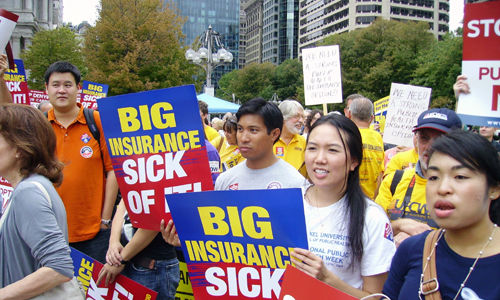
The announcement by Senate Majority Leader Harry Reid that the public option will reach the Senate floor was greeted by labor and other leaders as proof that the tide has turned in favor of health care reform.
It follows weeks of street demonstrations, Internet campaigns, TV and radio ads, and lobbying Congress for a bold public option.
Reid overrode the more conservative Senate Finance Committee bill to insert the public option into the legislation. His version of the option, however, would allow states to opt out of the national plan.
Vowing to continue the fight for health care reform, the AFL-CIO and Change to Win, the nation’s two labor federations, announced a national “Day of Action Call-In” to Congress on Nov. 5. Labor wants the public option but opposes parts of the Senate plan that would pay for health reform with increased taxes on workers.
“If you want to tax the gold-plated Goldman Sachs plan, that’s up to you,” AFL-CIO President Richard Trumka said at a press conference yesterday, “but we can’t accept taxes on middle class American health care plans.”
Labor is much happier with one of three measures circulating in the House, which pays for reform by a tax surcharge on only the wealthiest Americans.
AFSCME President Gerald McEntee, whose 1.4-million-member union represents tens of thousands of health care workers, said, “While the bill is by no means perfect, it is a significant improvement. Now we will work for an improved bill on the Senate floor and to pass a strong bill in the House.”
House Speaker Nancy Pelosi restated that her chamber’s bill – which will combine the three measures passed by committees earlier this year – would also have a public option.
The public option is supported by many liberals and progressives because they made the assessment that they could not win passage of more advanced legislation this year.
Alternatives to the current system fall on a continuum, they say.
The most progressive plan would be a national health service like the British have, in which health care is available to all and all health care providers are employed by the national health service.
The next best is a “Medicare-for-all” plan, similar to what exists in Canada.
Less advanced, but still an improvement over what we have now, many activists say, is a plan that includes a public option available to all. Under this plan a government-run program competes with private insurance companies.
The plan put forward by Sen. Reid is somewhat less than that. It contains a public option but it is not available to everyone. People who have insurance at work or people who live in states that choose not to join the program, for example, would not be included.
But it is superior, progressives say, to a public option with a “trigger.” Such an option would go into effect in the future, only if rates charged by private insurers continue to be unaffordable.
Supporters of health care reform were pleased that the public option, after weathering so many attacks, continues to enjoy wide support.
Dolores Randall, a nurse at Cook County Hospital in Chicago, said, “The media made a big mistake on this issue. The crazies who disrupted those town hall meetings in August were described as if they represented majority opinion. All they were was the crazies come out to have a big pep rally. They did not represent public opinion here or anywhere else.”
Health Care for America Now, the labor movement and progressive activists mounted an unprecedented push to regain the lead position on the issue.
Voters were mobilized and the insurance industry was singled out as the main culprit.
At press conferences, congressional hearings and almost every meeting held by health insurers, progressives brought forward the victims of health insurance greed and their stories.
Since late August HCAN and the labor movement have conducted more than 200 large demonstrations. Many were ignored by the major media, including demonstrations in New York and Los Angeles. The Los Angeles Times, for example, ignored a demonstration of several hundred thousand people that took place at WellPoint there. The crowds surrounded the insurance headquarters as well as the office of the newspaper itself, which is only a few blocks away.
In Salt Lake City, labor, MoveOn and other activists who stood outside Republican Sen. Orrin Hatch’s office holding signs noted that Hatch has taken $913,000 in contributions from health insurance companies. The action forced Hatch to say on national television that “MoveOn is not going to smear me without getting kicked in the teeth by me.”
President Obama himself has gone on the attack against the insurance companies. In a September speech to Congress about health reform Obama called for a strong public option and accused the right wing of “lies, plain and simple.”
“As soon as I sign this bill,” Obama declared, “it will be against the law for insurance companies to drop your coverage when you get sick or water it down when you need it most.
Organizing for America, the group created to organize Obama’s former campaign volunteers, on Oct. 20 alone generated 315,000 calls to Congress demanding health care overhaul.
After pretending to cooperate with the Obama administration and Democrats, industry CEOs and lobbyists double-crossed their onetime political allies on the Senate Finance Committee by publicly attacking its compromise bill.
The industry wasn’t happy with, among other things, amendments that reduced penalties for those who fail to buy private insurance and it threatened drastic hikes in insurance premium rates.
Liberal Democrats were angry but even the moderates and conservatives felt blindsided and caught by surprise.
On Oct. 21 the House Judiciary Committee voted to strip the industry of its 64-year-old anti-trust exemption as the chorus of support for a public option grew even more among elected officials.
Photo: PW/Ben Sears












Comments